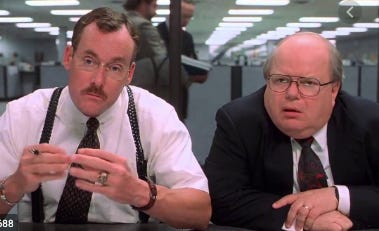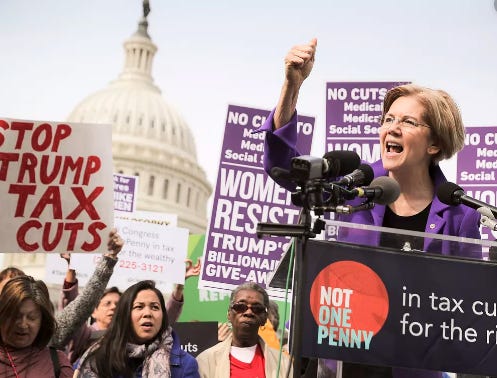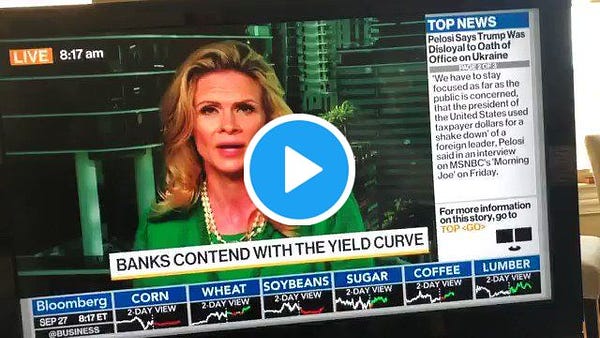Would an Elizabeth Warren Win Crash the Stock Market?
Hi,
Welcome to BIG, a newsletter about the politics of monopoly. If you’d like to sign up, you can do so here. Or just read on…
Today I’m going to write about a topic that continues to get chatter both on the campaign trail and on CNBC/Bloomberg, which is the performance of the stock market if Wall Street nemesis Elizabeth Warren continues to pick up steam in the Democratic primary and ultimately becomes the President.
First, some housekeeping. There are thousands of readers of BIG at this point, and you guys are generally super smart. So… send me tips! Like most of you, I am a frustrated professional who likes to see things work and work reasonably well, and I think the main political problem we face is that these guys are now in charge of everything.

Help me tell the story of monopolization/fraud in your corner of the world.
In future issues I’m going to cover the Israeli anti-monopoly movement and its weird relationship to Bibi Netanyahu, banking concentration and turmoil in repo markets, how Pentagon leaders actually think about corporate concentration among defense contractors, and why intentional negligence is a core part of any well-run predatory monopoly. Also, I’m interested in predatory monopolistic software providers in niche industries, like software for hospitals, small banks, auto dealers, and nonprofits.
And now…

Would an Elizabeth Warren Win Crash the Stock Market?
I was watching Bloomberg TV this morning, and saw an invited guest explain a recommendation to clients that they bet on a declining stock market in advance of the main Democratic primaries, in case Elizabeth Warren wins.


In explaining her theory, this analyst needlessly used the word ‘heretofore,’ which is a good indication she was just trying to sound smart. So my guess is that she’s a random Wall Street person, and is reflecting an emerging conventional wisdom. CNBC often covers fear of Warren; random anonymous private equity Democrats just told CNBC they will back Trump if Warren is the nominee. I imagine Trump will probably say that anyone who opposes him will cause the stock market and economy to tank.
So let’s ask that question. What happens if Warren wins?
The Bear Case: Warren Will End the Stock Market Monopoly Premium
The bear case is pretty obvious. Elizabeth Warren’s basic philosophy is producer-ism, which is that the people who do the work, whether that work is making or designing things, doing service work, or managing, should get the rewards from that work. Her belief is that corruption - whether through monopolization, financial manipulation, or conflicts of interest - are a way of extracting revenue and exerting control over people who work for a living.
This philosophy manifests in a number of ways. She wants to raise taxes on the wealthy, both through higher income taxes and an annual wealth tax. A wealth tax of two percent would force people like Jeff Bezos and the Walton family to sell stock on a regular basis. Warren would probably stop stock buybacks from the corporate treasury, and she would rapidly slow mergers and acquisitions. She would break up banks and more broadly tightly regulate finance and private equity. She would also shift the output share of the American corporate apparatus away from returns to capital and towards labor through pro-worker policies. All of this would put a drag on stocks.
In addition, her trade posture of economic patriotism would induce cost increases as in-shoring replaces offshoring, and she would probably take an aggressive approach to health care, defense industrial consolidation/contracting and climate change, meaning shifts in the petrochemical complex, defense stocks, the electric utility industry, and pharma and health insurance. These may harm the market overall, but they may just help and hurt specific sectors.
The strongest case though for Elizabeth Warren as a bearish indicator is the idea that stock market valuations are premised on froth and fraud. We have capitalized monopoly rents, and many billionaires - from Peter Thiel to Warren Buffett - are billionaires precisely because they buy into industries without competition.
Investment banks like Goldman Sachs have recommended to clients that they should welcome oligopolies, and buy them. Oligopolies may have a bad reputation for pillaging consumers, but they are attractive because in Goldman’s view they have “lower competitive intensity, greater stickiness, and pricing power with customers due to reduced choice, scale cost benefits including stronger leverage over suppliers, and higher barriers to new entrants all at once.”
Investors could read that loud and clear: Oligopolies can squeeze workers and suppliers, hike prices on consumers, and that makes oligopoly stocks attractive buys.
Popular investment books openly recommend monopolies. Before the financial crisis, you could find a book titled Monopoly Rules: How to Find, Capture and Control the Most Lucrative Markets in Any Business. It offered advice to young entrepreneurs, “you probably learned that monopolies are unnatural, illegal, and rare. Wrong! Wrong! Wrong! In fact, monopolies are often natural, usually legal, and surprisingly common.” Just in case the government held a different view, it advised earmarking part of the very high profits “for top-flight anti-trust attorneys.”
Buffett calls monopolies businesses with ‘moats.’ Under Elizabeth Warren, antitrust enforcers might start calling them crimes. That probably won’t be good for equity valuations.
The Bull Case: Warren Will End the Stock Market Monopoly Premium
The bull case is actually… the same idea. Everything that Warren would do would be oriented towards producer-ism, and producer-ism is good for business. For example, right now, Boeing is having serious problems because its products aren’t very good, a result of corruption and financialization.
Just a year ago Boeing appeared unstoppable. In 2018, the company delivered more aircraft than its rival Airbus, with revenue hitting $100bn. It was also a cash machine, shedding 20% of its workforce since 2012 while funneling $43bn into stock buybacks in roughly the same period. Boeing’s board rewarded its CEO, Dennis Muilenburg, lavishly, paying him $23m in 2018, up 27% from the year before.
There was only one problem. The company was losing its ability to make safe airplanes. As Scott Hamilton, an aerospace analyst and editor of Leeham News and Analysis, puts it: “Boeing Commercial Airplanes clearly has a systemic problem in designing, producing and delivering airplanes.”
If Warren breaks up Boeing and erodes the corruption underpinning Boeing’s business model, who knows what would happen to investor holdings? Maybe one of the spinoffs of Boeing might go down, but other parts of the company could go up as value gets unlocked. It could be in aggregate a net increase in market value. If the aerospace industry gets healthier in terms of products, the resulting multiple spinoffs may become more profitable because there’s just more value to go around.
To take a better example, look at Facebook and Instagram, Amazon and AWS, or Google and YouTube. Scott Galloway notes that any of these, if spun off, would probably lead to net increases in overall market value. Amazon and AWS are probably worth more apart than together, same with Facebook and Instagram. This isn’t just true in technology; in 2015, Goldman Sachs said that JP Morgan should be broken up and that would *help* stockholders in the bank.
Historically, break-ups and producer-ist policies have actually not been bad for the stock market. There are examples, like Teddy Roosevelt filing an antitrust suit against Northern Securities, that caused market problems. But there are many examples of just the opposite. One of my first newsletter issues was about how Standard Oil’s break-up, the break-up of electric utilities, and the break-up of AT&T in 1982 all increased productivity, innovation and stock prices. The Standard Oil break-up helped lead to the gasoline industry, the AT&T break-up helped lead to the internet. In both cases, an incumbent was squatting on world-changing technologies.
Imagine today Google being broken up into eight companies. I choose eight because Google has eight products with more than a billion users apiece: Search, Maps, Play, Android, Drive, Chrome, Gmail, and YouTube. What innovations in, say, the mapping space are being withheld because of larger strategic goals of Alphabet? I have no idea, but in the 1960s, it seemed very unlikely that software, then a free product bundled by IBM and then unbundled due to an antitrust suit, would become a trillion dollar economic force. As legal scholar Tim Wu asks, how many massive new world-changing industries don’t exist because monopolists won’t let them come into being?
There Is No Spoon
Ultimately, I have no idea whether the stock market will go up or down under Warren. What you think will happen boils down to what you believe politically about economic growth.
Do you believe that organizing low corporate taxes, encouraging financial engineering, and allowing markets to be the fiefdoms of aggressive monopolists keeps stock prices high? If so, then you would probably assume that Warren will be bad for stocks. Do you believe that there are yet worlds unseen, if only the human spirit is set free to tinker and sell? If so, then there’s a possible bull case, though such a case is complicated by the question of whether new and wonderful businesses will show up in higher stock valuations.
Either way, what Wall Street analysts are really saying is more about ego than predictions. Warren believes that the stock market shouldn’t be higher or lower, it should be a much less important part of the economy, largely irrelevant to the day to day decisions of business leaders and workers. Financiers, she believes, should simply not matter that much.
And this, Wall Street will not abide.
Thanks for reading. And if you liked this essay, you can sign up here for more issues of Big, a newsletter on how to restore fair commerce, innovation and democracy. If you want to really understand the secret history of monopoly power, buy my upcoming book, Goliath: The 100-Year War Between Monopoly Power and Democracy.
cheers,
Matt Stoller
P.S. I need your help. I recently ran into someone who works for a Time Warner. Like all Time Warner employees, she is heavily involved in the merger with AT&T. The merger kind of makes business sense, though only if the management of the new company is absolutely exceptional and has the ability to mesh two very different business lines into a mean and lean targeted ad machine.
AT&T does not have such a management. What they have, instead, are management consultants.
These consultants are something of a nightmare. If you ask them a question or ask for a spreadsheet, you get a request for an increase scope of work with a bill attached. This is exactly the kind of story I heard from government employees and government contractors about consulting, which is that it’s a misery inducing graft. Management consulting is a way for managers to not do any work or show any leadership, in both the corporate sector and government sector. Which incidentally is why both corporate America and the government can’t do anything anymore!
Anyway, you guys are smart, experienced, and disillusioned. Send me your stories on the worst management consulting experience you’ve had or seen. Tell me about your Bob’s. I’ll strip your name out and send along the story for all of us to enjoy.
You can just reply to this email, or email me at stoller at gmail.com.

